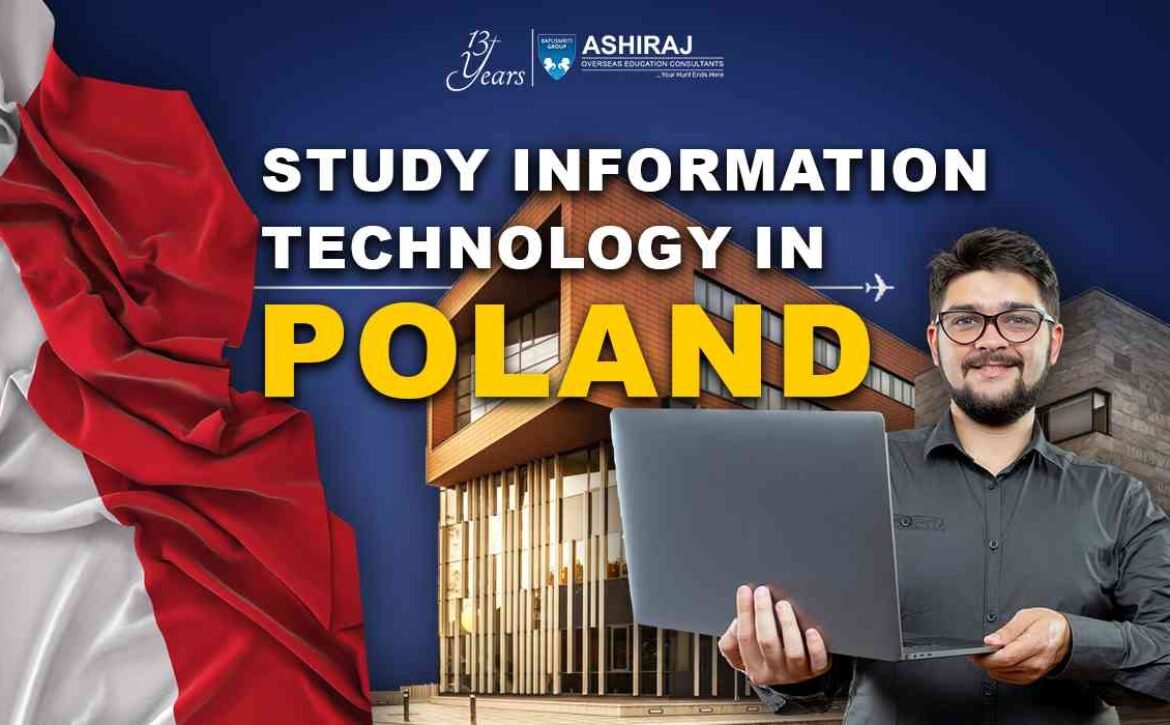
Information Technology in Poland
Information technology in Poland has witnessed significant growth and development in recent years, positioning the country as a prominent player in the global tech industry. With a rapidly expanding economy and a skilled workforce, Poland has become a hub for IT outsourcing, software development, and innovation. The country’s strategic location in Central Europe, coupled with its robust infrastructure and supportive government policies, has attracted numerous multinational corporations and startups to establish their presence in Poland’s thriving IT sector.
Information technology in Poland encompasses a wide range of industries, including software development, cybersecurity, e-commerce, and telecommunications. The Polish government has made substantial investments in digital infrastructure and education, fostering a conducive environment for technological advancement and entrepreneurship. As a result, Poland has emerged as a competitive destination for IT talent and investment, driving innovation and economic growth in the country.
Why to Study Information Technology in Poland?
- Thriving IT Sector: Poland boasts a rapidly growing IT industry, offering abundant opportunities for students to gain hands-on experience and exposure to cutting-edge technologies.
- Cost-Effective Education: Compared to other European countries, studying IT in Poland is relatively affordable, with reasonable tuition fees and living expenses.
- Internationally Recognized Degrees: Polish universities offer high-quality education in information technology, recognized worldwide, ensuring students receive a valuable degree.
- Multicultural Environment: Poland’s diverse student population creates a multicultural learning environment, fostering global perspectives and collaboration.
- English-Taught Programs: Many universities in Poland offer IT programs taught entirely in English, eliminating language barriers for international students.
- Strong Industry Connections: Polish universities collaborate closely with the IT industry, providing students with opportunities for internships, projects, and networking.
- Innovation and Research Opportunities: Poland encourages innovation and research in IT, offering students access to state-of-the-art facilities and resources.
- Gateway to European Markets: Studying IT in Poland provides access to the European Union’s vast market, opening doors to numerous career opportunities and possibilities for entrepreneurship.
In conclusion, studying Information Technology in Poland offers students a unique blend of academic excellence, practical experience, and global opportunities, making it an attractive destination for aspiring IT professionals.
Top Universities to Study Information Technology in Poland
University | QS World University Ranking 2023 | Type of University | Average Annual Fees | Programs Offered |
University of Warsaw | 301-350 | Public | $1,000 – $4,000 | Computer Science, Information Technology |
AGH University of Science and Technology | 501-550 | Public | $1,500 – $3,500 | Computer Engineering, Information Systems |
Jagiellonian University | 601-650 | Public | $1,200 – $3,000 | Computer Science, Software Engineering |
Warsaw University of Technology | 601-650 | Public | $1,500 – $4,000 | Information Technology, Cybersecurity |
Wroclaw University of Science and Technology | 701-750 | Public | $1,200 – $3,500 | Computer Science, Artificial Intelligence |
When considering where to pursue Information Technology studies in Poland, the country offers several top-notch universities renowned for their quality education and research opportunities. Here’s a breakdown of the top five universities for Information Technology in Poland according to the QS World University Rankings 2023:
- University of Warsaw: Ranked in the 301-350 range, this public institution offers programs in Computer Science and Information Technology at an average annual fee ranging from $1,000 to $4,000.
- AGH University of Science and Technology: Ranking between 501-550, AGH provides courses in Computer Engineering and Information Systems with average annual fees ranging from $1,500 to $3,500.
- Jagiellonian University: Positioned in the 601-650 range, Jagiellonian University offers programs in Computer Science and Software Engineering with annual fees ranging from $1,200 to $3,000.
- Warsaw University of Technology: Also in the 601-650 range, this university offers courses in Information Technology and Cybersecurity with fees ranging from $1,500 to $4,000 annually.
- Wroclaw University of Science and Technology: Ranked between 701-750, Wroclaw University offers programs in Computer Science and Artificial Intelligence with average annual fees ranging from $1,200 to $3,500. These universities provide diverse programs, research opportunities, and a conducive environment for students pursuing Information Technology in Poland.
Course Curriculum for Information Technology in Poland
- Core Subjects: Information technology programs in Poland typically cover core subjects such as computer programming, database management, and network administration, providing students with a strong foundation in IT fundamentals.
- Specialized Courses: Students can choose from a variety of specialized courses based on their interests and career goals, including software development, cybersecurity, artificial intelligence, and data science, ensuring a well-rounded education tailored to industry demands.
- Practical Training: The curriculum often includes hands-on training and projects, allowing students to apply theoretical knowledge in real-world scenarios and develop practical skills essential for the IT industry.
- Industry-Relevant Skills: Information technology programs in Poland focus on equipping students with industry-relevant skills such as problem-solving, critical thinking, and collaboration, preparing them for successful careers in a rapidly evolving technological landscape.
- Internship Opportunities: Many universities offer internship opportunities with leading IT companies, allowing students to gain valuable industry experience and establish professional connections before graduating, enhancing their employability in the competitive job market.
Overall, the course curriculum of Information Technology in Poland is designed to provide students with a comprehensive education, combining theoretical knowledge with practical skills, and preparing them for successful careers in the dynamic field of IT.
Eligibility Criteria & Admission Requirements for MS in Information Technology in Poland
- Language Proficiency: Applicants are required to demonstrate proficiency in English through standardized tests such as IELTS (International English Language Testing System) or TOEFL (Test of English as a Foreign Language). Minimum scores typically range from 6.0 to 7.0 for IELTS and 80 to 100 for TOEFL.
- Standardized Tests: Some universities may require applicants to submit scores from standardized tests like GRE (Graduate Record Examination) or GMAT (Graduate Management Admission Test). While GRE scores are commonly accepted for technical programs, GMAT scores are often preferred for business-related programs.
- Academic Qualifications: Applicants must hold a relevant undergraduate degree in Information Technology, Computer Science, or a related field from a recognized institution. A minimum GPA may be required by some universities.
- Documentation: Prospective students need to submit essential documents such as a valid passport, academic certificates, and transcripts verifying their educational background.
- Work Experience: While not always mandatory, some universities may consider relevant work experience in the IT industry as a factor in the admissions process, especially for applicants to advanced degree programs or those seeking scholarships.
Eligibility Criteria Table:
Criteria | Minimum Marks/Requirements |
IELTS | 6.0 – 7.0 |
TOEFL | 80 – 100 |
GRE | Varies |
GMAT | Varies |
Meeting the eligibility criteria is the first step for prospective students interested in pursuing Information Technology in Poland, ensuring they possess the necessary language proficiency, academic background, and documentation to apply for admission to their desired programs.
Documents Required for Studying Information Technology in Poland
- Passport: A valid passport is essential for international students applying to universities in Poland for Information Technology programs.
- Letters of Recommendation (LOR): Two letters of recommendation from academic or professional references are typically required to support the student’s application.
- Statement of Purpose (SOP): An SOP outlining the applicant’s academic background, career goals, and reasons for choosing Information Technology in Poland is necessary for admission consideration.
- Curriculum Vitae (CV): A comprehensive CV highlighting the applicant’s educational qualifications, work experience, skills, and achievements is required.
- Official High School Transcripts: Transcripts from the applicant’s high school or secondary education institution, indicating grades and coursework, are necessary for undergraduate admissions.
- Educational Certificates: Certificates or diplomas attesting to the applicant’s academic qualifications, such as a bachelor’s degree or equivalent, are required for graduate admissions.
- Work Experience Certificate: If applicable, a certificate verifying the applicant’s relevant work experience in the field of Information Technology is necessary.
- Proof of Financial Resources: Applicants must demonstrate their ability to cover tuition fees, living expenses, and other costs associated with studying in Poland by providing proof of financial resources, such as bank statements or sponsorship letters.
Ensuring all required documents are accurately prepared and submitted is crucial for a smooth application process for Information Technology in Poland.
Admission Process for Information Technology in Poland
- Research Universities: Explore universities in Poland offering Information Technology programs and review their admission requirements, curriculum, and faculty expertise.
- Check Eligibility: Ensure you meet the eligibility criteria, including language proficiency (IELTS or TOEFL scores), academic qualifications, and standardized test scores (GRE or GMAT if required).
- Prepare Documents: Gather necessary documents such as passport, letters of recommendation (LOR), statement of purpose (SOP), curriculum vitae (CV), official transcripts, educational certificates, work experience certificate, and proof of financial resources.
- Submit Application: Complete the university’s online application form and submit required documents by the specified deadline. Pay attention to any application fees that may apply.
- Wait for Response: Wait for the university to review your application. This process may take several weeks. Some universities may require additional interviews or assessments.
- Receive Admission Offer: If accepted, you will receive an official admission offer from the university. Review the terms and conditions carefully.
- Accept Offer and Apply for Visa: Accept the admission offer and proceed to apply for a student visa. Prepare additional documents such as health insurance and accommodation details as required.
- Arrive in Poland: Once your visa is approved, make travel arrangements to arrive in Poland before the start of the academic term.
Following these steps will help you navigate the admission process smoothly for Information Technology in Poland, ensuring a successful start to your academic journey.
“Education is the most powerful weapon which you can use to change the world.”
Nelson Mandela
Cost of Information Technology Course in Poland
- Tuition Fees: The tuition fees for Information Technology programs in Poland vary depending on the university and the level of study. On average, undergraduate programs can range from $2,000 to $5,000 per year, while graduate programs may cost between $2,500 to $7,000 per year.
- Living Expenses: Living expenses in Poland are relatively affordable compared to other European countries. Students can expect to spend around $400 to $600 per month on accommodation, food, transportation, and other personal expenses.
- Scholarship Opportunities: Many universities in Poland offer scholarships and financial aid to international students based on academic merit, financial need, or specific criteria. These scholarships can help offset the cost of tuition and living expenses.
- Part-Time Work: International students in Poland are allowed to work part-time during their studies. Part-time employment can help students cover some of their living expenses while gaining valuable work experience.
- Health Insurance: Health insurance is mandatory for all students studying in Poland. The cost of health insurance varies depending on the provider and coverage options but is typically affordable for students.
Considering these factors, studying Information Technology in Poland can be a cost-effective option for international students seeking quality education and valuable experiences in a vibrant European country.
Scholarships for Information Technology Courses in Poland
Scholarship Name | Amount | Application Deadline |
Polish National Agency for Academic Exchange (NAWA) Scholarship | Varies | May 31 (annually) |
Erasmus+ Scholarships | Varies | Varies |
Visegrad Fund Scholarships | Up to €6,000 | March 15 (annually) |
Copernicus Scholarship Program | Varies | Varies |
Ignacy Łukasiewicz Scholarship Program | Varies | Varies |
Scholarships for Information Technology in Poland offer financial support to international students pursuing their studies in this field. Here’s a breakdown of some notable scholarships available:
- Polish National Agency for Academic Exchange (NAWA) Scholarship: This scholarship provides financial assistance to international students studying Information Technology in Poland. The application deadline is May 31 annually, and the amount varies depending on the program and academic merit.
- Erasmus+ Scholarships: Erasmus+ offers various scholarships for students studying in Europe, including Poland. The scholarship amount varies, and the application deadline depends on the specific program.
- Visegrad Fund Scholarships: These scholarships support students from Visegrad Group countries pursuing higher education in Poland. The deadline for application is March 15 annually, and the scholarship amount can be up to €6,000.
- Copernicus Scholarship Program: This program provides financial aid to outstanding international students studying in Poland. The scholarship amount and application deadline vary.
- Ignacy Łukasiewicz Scholarship Program: Named after the famous Polish inventor, this scholarship supports students pursuing master’s or doctoral studies in Poland. The scholarship amount and application deadline vary depending on the specific program and institution. Applying for these scholarships can significantly alleviate the financial burden of studying Information Technology in Poland.
Career Opportunities After Information Technology in Poland
Job Profile | Average Salary (per year) |
Software Developer | $30,000 – $50,000 |
IT Consultant | $35,000 – $60,000 |
Data Analyst | $25,000 – $45,000 |
Cybersecurity Analyst | $35,000 – $55,000 |
Network Engineer | $30,000 – $50,000 |
After completing Information Technology studies in Poland, graduates can pursue various career opportunities in the rapidly growing tech industry. Here are some common job profiles and their average salaries:
- Software Developer: Responsible for designing, coding, and testing software applications, software developers earn an average salary ranging from $30,000 to $50,000 per year.
- IT Consultant: IT consultants provide strategic advice, solutions, and support to organizations regarding their IT infrastructure and systems, earning an average salary of $35,000 to $60,000 annually.
- Data Analyst: Data analysts analyze and interpret data to help organizations make informed decisions, with an average salary ranging from $25,000 to $45,000 per year.
- Cybersecurity Analyst: Cybersecurity analysts protect organizations from cyber threats by implementing security measures and monitoring systems, earning an average salary of $35,000 to $55,000 annually.
- Network Engineer: Network engineers design, implement, and maintain computer networks, with an average salary ranging from $30,000 to $50,000 per year.
These career opportunities offer competitive salaries and growth prospects for Information Technology graduates in Poland, making it an attractive destination for aspiring tech professionals.
Frequently Asked Questions About Information Technology in Poland
Admission requirements typically include language proficiency (IELTS or TOEFL), academic qualifications, standardized test scores (GRE or GMAT if required), and submission of relevant documents like transcripts, letters of recommendation, and a statement of purpose.
Yes, there are various scholarships available, including those offered by the Polish National Agency for Academic Exchange (NAWA), Erasmus+, Visegrad Fund, Copernicus Scholarship Program, and Ignacy Łukasiewicz Scholarship Program, among others.
The cost varies depending on the university and level of study. On average, tuition fees range from $2,000 to $7,000 per year for undergraduate and graduate programs, while living expenses are approximately $400 to $600 per month.
Yes, many universities in Poland offer Information Technology programs taught entirely in English to accommodate international students.
Graduates can pursue various career paths including software development, IT consulting, data analysis, cybersecurity, network engineering, and more, with average salaries ranging from $25,000 to $60,000 per year.
Yes, international students are allowed to work part-time during their studies, providing an opportunity to gain work experience and supplement their income.
The duration of undergraduate programs is typically three to four years, while graduate programs (master’s or PhD) can range from one to two years or more, depending on the level and specialization.
Yes, Poland offers quality education, affordable tuition fees, a vibrant student life, and numerous job opportunities in the Information Technology sector, making it an attractive destination for international students.
Yes, many universities in Poland collaborate with industry partners to offer internship opportunities for Information Technology students, providing valuable hands-on experience and networking opportunities.
The application process typically involves researching universities, checking eligibility criteria, preparing required documents, submitting an online application, waiting for admission decisions, and applying for a student visa if accepted.




